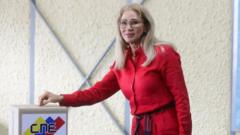In a contested electoral atmosphere, the National Electoral Council (CNE), dominated by President Nicolás Maduro's supporters, announced that the ruling party secured victories in 23 out of 24 governorships and garnered 82.68% of votes for the National Assembly. Opposition leader María Corina Machado countered these claims, asserting that actual voter turnout was below 15%, indicating widespread dissent against the government. Reports from independent journalists corroborated her claims, showing low turnout and minimal queues at polling stations compared to the previous presidential election.
Machado, in hiding following a crackdown after the last election, declared that over 85% of the electorate abstained to oppose the regime. While the CNE claimed a turnout of 42.6%, distrust of its impartiality remains prevalent among opposition factions, especially after last year’s controversial presidential vote. Several opposition figures, including Machado, had called for a boycott of the elections asserting that previous electoral outcomes should be respected before any further voting took place.
Despite the boycott, some opposition leaders opted to run, claiming participation was essential to resist the regime. Among them was Henrique Capriles, who encouraged his base to vote, countering Machado’s calls for abstention. While the PSUV celebrated retaining control over Zulia and Barinas, one state remained under opposition control.
The election was marred by a wave of arrests targeting opposition members accused of plotting to disrupt the vote, an action decried by Machado as "state terrorism." The electoral process also included provisions for a controversial vote in the Essequibo region, claimed by Venezuela but administered by neighboring Guyana, raising further tensions amid international scrutiny.
In summary, Venezuela's government hailed its electoral successes, while the opposition rejected the legitimacy of the process, voicing concerns over voter repression and fraudulent practices. The ongoing political strife reveals deep divisions within the country as the future of democracy in Venezuela hangs in the balance.
Machado, in hiding following a crackdown after the last election, declared that over 85% of the electorate abstained to oppose the regime. While the CNE claimed a turnout of 42.6%, distrust of its impartiality remains prevalent among opposition factions, especially after last year’s controversial presidential vote. Several opposition figures, including Machado, had called for a boycott of the elections asserting that previous electoral outcomes should be respected before any further voting took place.
Despite the boycott, some opposition leaders opted to run, claiming participation was essential to resist the regime. Among them was Henrique Capriles, who encouraged his base to vote, countering Machado’s calls for abstention. While the PSUV celebrated retaining control over Zulia and Barinas, one state remained under opposition control.
The election was marred by a wave of arrests targeting opposition members accused of plotting to disrupt the vote, an action decried by Machado as "state terrorism." The electoral process also included provisions for a controversial vote in the Essequibo region, claimed by Venezuela but administered by neighboring Guyana, raising further tensions amid international scrutiny.
In summary, Venezuela's government hailed its electoral successes, while the opposition rejected the legitimacy of the process, voicing concerns over voter repression and fraudulent practices. The ongoing political strife reveals deep divisions within the country as the future of democracy in Venezuela hangs in the balance.


















